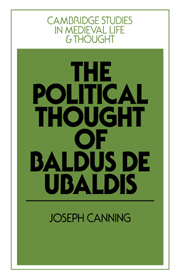Book contents
- Frontmatter
- Contents
- Preface
- Abbreviations
- INTRODUCTION
- 1 UNIVERSAL AND TERRITORIAL POWERS: THE FUNDAMENTAL STRUCTURE OF BALDUS' POLITICAL THOUGHT
- 2 THE NATURE AND LIMITATIONS OF THE EMPEROR'S POWER
- 3 THE SOVEREIGNTY OF INDEPENDENT CITY-REPUBLICS
- 4 MEMBERSHIP OF THE CITY-COMMUNITY: POLITICAL MAN AND CITIZENSHIP
- 5 THE CITY-‘POPULUS’ AS A SELF-GOVERNING CORPORATION
- 6 KINGSHIP AND ‘SIGNORIE’
- CONCLUSION
- APPENDIX I Latin text of passages translated into English and of part of Baldus' commentary on D.1.1.9
- APPENDIX II Notes on civilians and canonists mentioned in the text
- Bibliography
- Index
2 - THE NATURE AND LIMITATIONS OF THE EMPEROR'S POWER
Published online by Cambridge University Press: 29 October 2009
- Frontmatter
- Contents
- Preface
- Abbreviations
- INTRODUCTION
- 1 UNIVERSAL AND TERRITORIAL POWERS: THE FUNDAMENTAL STRUCTURE OF BALDUS' POLITICAL THOUGHT
- 2 THE NATURE AND LIMITATIONS OF THE EMPEROR'S POWER
- 3 THE SOVEREIGNTY OF INDEPENDENT CITY-REPUBLICS
- 4 MEMBERSHIP OF THE CITY-COMMUNITY: POLITICAL MAN AND CITIZENSHIP
- 5 THE CITY-‘POPULUS’ AS A SELF-GOVERNING CORPORATION
- 6 KINGSHIP AND ‘SIGNORIE’
- CONCLUSION
- APPENDIX I Latin text of passages translated into English and of part of Baldus' commentary on D.1.1.9
- APPENDIX II Notes on civilians and canonists mentioned in the text
- Bibliography
- Index
Summary
Before examining Baldus' theories of sovereign cities, kingdoms and signori it is logically necessary first to complete the picture of the nature and extent of the emperor's authority because of his fundamental de iure position, which results in his role as the model for sovereign power, directly in the case of monarchies, more subtly in that of cities. This is not to deny that some aspects of imperial authority are unique to the emperor; others, however, reappear in different contexts.
The fundamental structure of Baldus' political thought makes it necessary to distinguish between the emperor and other monarchs, a point of interpretation reinforced by the need to bear in mind the historical entities he is discussing, if his meaning is to be established. Thus it would misrepresent his theory of monarchy if it were discussed in blanket-terms, such as ‘the ruler’ or ‘the monarch’, without distinguishing between the emperor, the pope, kings and signori, who, while sharing common elements in their public power, each exhibit characteristics peculiar to themselves. Where Baldus employs the term imperator, he clearly means the emperor, except in those passages where he is specifically using it in the context of another ruler. It is with the term princeps that problems might appear to arise, because it features in his discussion of all forms of monarchy. Because of the nature of the juristic sources on which Baldus is commenting, the term princeps without qualification normally and primarily refers to the emperor; and it is usually made clear when it is applied in a secondary sense to other monarchs or, indeed, princes, as in the case of imperial electors.
- Type
- Chapter
- Information
- The Political Thought of Baldus de Ubaldis , pp. 71 - 92Publisher: Cambridge University PressPrint publication year: 1987



